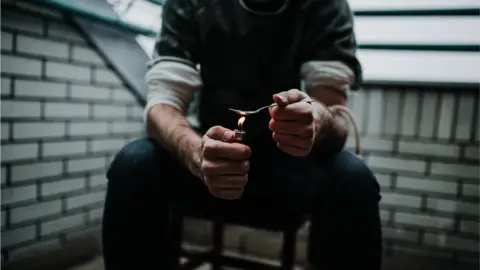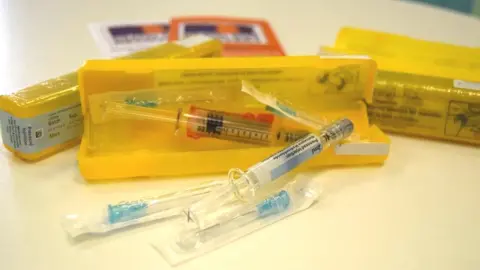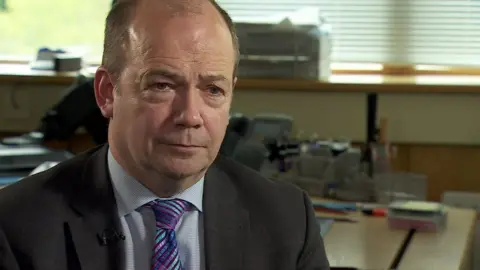Drug consumption rooms 'should be considered' in NI
 mladenbalinovac
mladenbalinovacConsideration should be given to providing rooms where people can safely inject themselves with illegal drugs, NI's chief medical officer has said.
Dr Michael McBride told the BBC there was a "significant problem" with drug users injecting in public places.
He said health professionals had seen a clear increase in the use of heroin among patients in recent years.
However any decision to provide so-called consumption rooms would be for a Stormont minister, he added.
All options
"My own view on this is that we need to look at all options that can reduce the harm associated with intravenous drug misuse," he said.
"Yes, we have reduced the risk of overdose through making available Naloxone, but we also need to look at whether or not there are other alternative models such as consumption rooms.
"Ultimately, decisions of that nature will be a matter for a minister in an executive in due course."
 CGL
CGLPSNI Detective Superintendent Bobby Singleton said the PSNI was following the debate around safe drug rooms "with a very keen interest".
"Law enforcement clearly has a role to play in terms of restricting the availability of illicit and prescription drugs on the street in Northern Ireland. It is a priority for communities and consequently it is a priority for us," he said.
"We recognise the limitations of law enforcement when it comes to dealing with an addressing the harms associated with, in particular intravenous drug misuse."
On Monday, it emerged that drug-related deaths among males in Northern Ireland have almost doubled in the last 10 years.
'Complex issue'
Asked about the likelihood of consumption rooms being introduced as a means of reducing deaths, Dr McBride explained that among health professionals, there were "a range of views around the effectiveness of such an approach" and that some fear it could encourage addicts to continue injecting.
"I don't think it's a problem that's going to go away any time soon," he said.
"We're beginning to make progress in some areas, but this is a complex issue, there are no simple solutions."
In a statement to the BBC, the British Medical Association (BMA) said it supported the introduction of a wider range of evidence-based interventions for treating illicit drug dependence - such as heroin-assisted treatment and supervised consumption rooms.
The organisation said it believed there should be a "refocusing to prioritise treatment and support over criminalisation and punishment of drug users".

Earlier in the week, the Department of Health said that over the past two years there had been a "growing pressure" on a range of alcohol and drug-related services, leading to the development of "unacceptable waiting lists" for some key services across Northern Ireland, but particularly in Belfast.
It said this had been the focus of "significant action and investment" by the Department of Health, the Health and Social Care Board and the Belfast Trust.
As a result, it said, average waiting times for substitution therapy in the Belfast Trust had fallen from 41 weeks in July 2017 to 15 weeks in December 2018.
Dr McBride described the 2017 waiting times as "clearly unacceptable" and acknowledged an under-investment in drugs services in the past.
However that investment had now been made available, he added, and the waiting times needed to come down even further.
"It's not because the service isn't trying hard enough," he said.
"It's a reflection of the demand on the services."
